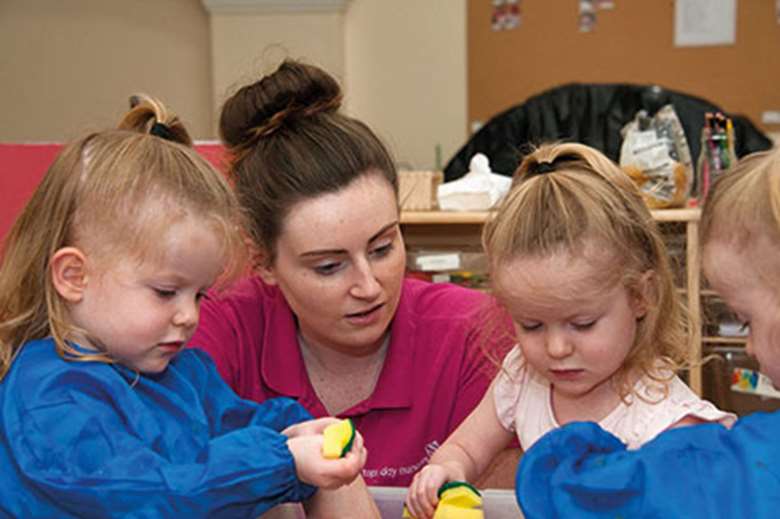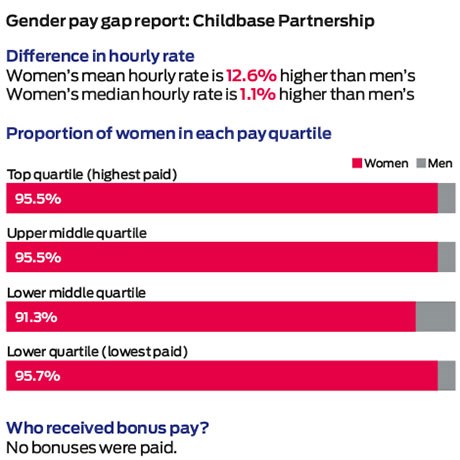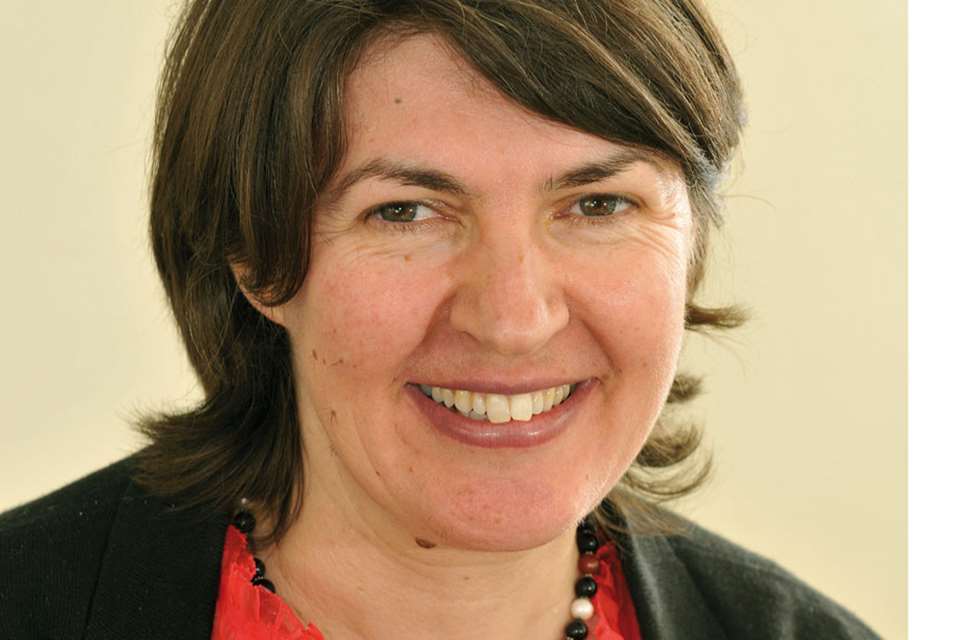Major nursery groups reveal gender pay gap
Monday, April 16, 2018
Nursery groups with more than 250 employees have reported on their gender pay gaps, with women ahead in some companies, but men still paid more in others despite the female-dominated nature of the early years sector.

Nursery groups with more than 250 employees have reported on their gender pay gaps, with women ahead in some companies, but men still paid more in others despite the female-dominated nature of the early years sector.
New gender pay reporting legislation has required large companies to reveal the extent of pay differences between men and women for the first time.
Nationwide, three-quarters of companies have been shown to pay men more than women, with the average pay gap 18.4 per cent in favour of men, but the early years picture is different.
Yellow Dot in Hampshire, sold recently to Bright Horizons, was one of the companies to most significantly defy the gender pay gap trend, paying women 80.6 per cent more than men (median average).
Male employees at Yellow Dot made up 17.9 per cent of the lowest paid members of staff and just 2.6 per cent of the highest.
While bonuses were paid out relatively more equally, to 69.6 per cent of women and 53.1 per cent of men, women’s median bonus pay was 622.3 per cent higher than that received by men.
In a statement, Yellow Dot said, ‘Our team is predominantly female, with the majority of the male team employed in the lower-skill areas of childcare. We are confident that men and women are paid equally for doing equivalent jobs across our workforce.
‘We are committed to fairness, equality and inclusion throughout our team. We are working hard to encourage men to join and be promoted upwards through our organisation. By encouraging young men into childcare at an early age and providing them with appropriate support, training and apprenticeships, we are confident that we can increase the number who stay in the childcare industry and hence increase their chances of promotion and increase remuneration.’
THE TOP 25
The top 25 largest chains in the UK, according to Nursery World’s Nursery Chains league table, revealed varying results.
Tops Day Nurseries pays women 2 per cent more (all figures median average) than men, and bonuses were received exclusively by female employees, while Childbase Partnership, which runs 41 day nurseries in the South of England, pays women 1.1 per cent more than men.
Virginia Mead-Herbert, managing director of Childbase Partnership, where nearly 5 per cent of the workforce is male compared with a sector average of just 2 per cent, said the results were expected.
‘With higher than average hourly rates at Childbase Partnership, which include apprentice rates of £5.55, these results are entirely consistent with our expectations. Equally, we are operating in a highly gendered sector so our results should reflect this key fact,’ she said.

Busy Bees, the largest nursery group in the UK, is registered as eight separate legal entities, with women earning less than men in four, more in three, and no difference recorded in one.
In its report on the pay gap, the group acknowledged the unique gender issues facing the early years sector, commenting, ‘Although Busy Bees is an equal opportunities employer, most organisations within our sector will have a predominantly female workforce. And while we celebrate women in leadership, a goal for us is to attract more male practitioners to our company.
‘We believe achieving a more diverse workforce will allow us to provide rich learning opportunities and effective role modelling to the children in our care, and create a well-rounded pool of talent.
‘Achieving this will not come quickly or easily, but we’re working hard on changing this culture and are ensuring men feel encouraged and inspired to come and work with us. We’re also ensuring our male colleagues are provided with opportunities to progress – one of our most recent regional director appointments was male.’
However, despite the prevalence of women in the early years, eight of the biggest chains with data available reported a pay gap that favoured men.
- Bright Horizons, the UK’s second-largest nursery group, reported women’s earnings as a median average of 15.1 per cent lower than men’s, with 9.9 per cent of women compared with 11.4 per cent of men earning a bonus. The bonuses that were given to women were 61.9 per cent lower on median average than those received by men.
- The Pre-school Learning Alliance reported women earning 20 per cent less.
- Just Childcare had women earning 21 per cent less.
- Kids Allowed had a gap in favour of men of 13.9 per cent.
- Toad Hall (Careroom) paid men 8.7 per cent more.
- Kids Planet paid women 3.1 per cent less.
- London Early Years Foundation had a 5.2 per cent gap in favour of men.
- Mama Bear’s Day Nursery, which owns 23 nurseries in the South West of England, paid women an average of 1.6 per cent less than men last year.
However, Mama Bear’s bonuses were paid exclusively to women over the year, with 4.9 per cent receiving an additional sum.
Owner of Mama Bear’s, Tony Driffield, explained, ‘Although there is a difference of 27.5 per cent in the mean pay of full-pay men and women, this is because relatively more of the males we employ (12 per cent) are in management positions, whereas our female managers (which outnumber our male managers by 15:1) represent only 7 per cent of our female workforce.
‘A quick glance at the median average shows a difference in pay rates of 1.6 per cent – almost no difference at all.
‘Our bonus scheme is available to the nursery managers. As we do not currently have any male nursery managers, no male staff are bonused.
‘For Mama Bear’s, and for the daycare industry in general, the challenge is to attract more male carers into the industry. As childcare is not traditionally seen as a career for men, this is particularly challenging.
‘However, we hope that with an inclusive recruitment and apprenticeship programme, as well as the opportunities for continuous professional development, upskilling and career progression that being a strong local group brings, we can challenge this way of thinking.’
A Pre-school Learning Alliance spokesperson said, 'The Alliance is committed to ensuring equal opportunities for all staff, and our pay structure ensures that all employees who hold the same job role are paid the same wage, regardless of gender. With a majority female Operational Management Group, we are proud to have a high level of female representation at the most senior levels of the organisation.
'Our pay gap figures are the result of a predominantly female workforce and an organisational commitment to work-life balance - which means a significant proportion of the Alliance’s female workforce works part-time and term-time - alongside a under-representation of men in practitioner roles, a challenge that continues to face the sector as a whole.
'As a representative organisation, we are committed to continuing to campaign for better funding to help improve salary levels across the sector and ensure that pay - for both men and women - truly reflects the value of the early years practitioner role.'
The only nursery group in the top 25 Nursery Chainstable to report equal pay was Bertram Nursery Group, where men and women received the same median hourly rate.
- Search gender pay gap data at: https://gender-pay-gap.service.gov.uk







